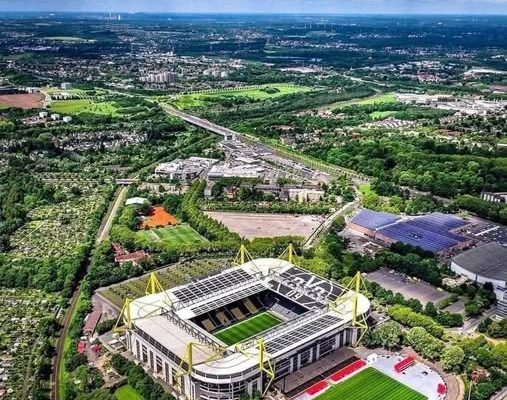The Westfalenstadion, officially known as Signal Iduna Park, stands as a monumental symbol of football passion, history, and unmatched atmosphere. Located in Dortmund, Germany, it is more than just a stadium—it is the heart and soul of Borussia Dortmund, one of Germany’s most iconic football clubs. For many fans, the Westfalenstadion is the epitome of football culture, where every match feels like an epic event and every goal, a moment of pure joy.
When you first approach the Westfalenstadion, you can’t help but be struck by its sheer size and the energy that surrounds it. The towering yellow and black structure is an imposing sight, and as you draw closer, you begin to hear the sounds of the crowd—laughter, chatter, and the faint hum of excitement building toward a fever pitch. This is a stadium that doesn’t just house a football team; it houses a community, a tribe of fans united by a love for the game. It’s a place where every match feels larger than life, where the energy of 81,365 spectators can make the ground tremble.
The stadium’s architecture is as much a part of its identity as the fans who fill it. Built in 1974 and expanded several times, including the notable improvements ahead of the 2006 FIFA World Cup, the Westfalenstadion features a stunning blend of modern design and historical charm. Its most notable feature is the iconic South Stand, or “Südtribüne,” the largest terrace for standing spectators in European football. The sheer scale of the South Stand is breathtaking. It can hold over 25,000 fans, and when the “Yellow Wall,” as it is affectionately called, is in full voice, the atmosphere is nothing short of electrifying. The fans create an undulating sea of yellow and black, with flags, banners, and scarves, all synchronized in a chorus of chants that reverberate through every corner of the stadium.
The Yellow Wall is not just a visual spectacle, but a sound phenomenon. The collective roar of the crowd, the synchronized clapping, the chants of “Borussia! Borussia!”—all combine to form a cacophony that seems to reach deep into your bones. It is a sound that is felt as much as it is heard. The sheer power of this wall of noise has earned the Westfalenstadion a reputation as one of the most intimidating places for opposing teams to play in Europe. Visiting players speak of the overwhelming pressure they feel when stepping into the stadium, the noise drowning out their thoughts, the fans never letting them forget they are outsiders in this sacred space.
But it’s not just the South Stand that makes the stadium unique. The entire ground is steeped in history, from the moment you step inside. The sleek modern seats of the Westfalenstadion offer a perfect view from virtually every angle, ensuring that fans can enjoy the match no matter where they’re sitting. The pitch itself is pristine, and the surrounding stands are designed in such a way that it feels like the fans are part of the action, intimately connected to the game. The steep stands, built to bring the spectators closer to the pitch, give you the sense that you are not just watching a football match—you are living it, breathing it.
The atmosphere in the Westfalenstadion is something that is hard to capture in words. It’s not just a place to watch football; it’s a place where memories are made. Whether it’s the thunderous cheer after a last-minute goal or the collective groan of disappointment after a missed opportunity, the crowd’s emotions are as much a part of the experience as the football on the pitch. Every corner of the stadium tells a story, from the die-hard fans who have supported Borussia Dortmund for decades to the newcomers experiencing their first match. For many, attending a game at the Westfalenstadion is a pilgrimage, an event that transcends the ordinary.
Over the years, the stadium has witnessed some of the most memorable moments in football history. From legendary players like Matthias Sammer and Lothar Matthäus to modern-day icons like Erling Haaland and Marco Reus, the Westfalenstadion has seen it all. The stadium has been the backdrop for numerous Bundesliga triumphs, German Cup victories, and even the unforgettable run to the 2013 UEFA Champions League final, where Borussia Dortmund faced Bayern Munich in an all-German final that will forever be etched in the club’s lore. It was during these moments that the Westfalenstadion truly proved its worth as a venue that amplifies the emotions of every event, transforming the ordinary into the extraordinary.
The crowd at the Westfalenstadion has a unique characteristic that sets it apart from other football stadiums. It’s a crowd that lives and breathes for Borussia Dortmund. They are not just fans; they are the club’s heartbeat. The passion of the supporters is infectious, and the atmosphere in the stadium can quickly escalate from one of quiet anticipation to uncontainable ecstasy. Whether the team is winning or losing, the fans maintain an unwavering loyalty to their club, creating a bond that is hard to find in any other stadium around the world.
Dortmund is a city that takes immense pride in its football team, and that pride is reflected in every aspect of the Westfalenstadion. From the workers at the stadium to the fans in the stands, everyone plays a part in creating the legendary atmosphere that is synonymous with Borussia Dortmund. The club’s slogan, “Echte Liebe” (True Love), encapsulates the deep emotional connection between the team and its fans. It’s a connection that transcends wins and losses, a bond that remains unbroken even in times of adversity. The fans of Borussia Dortmund don’t just support the team; they are the team, and their energy is what powers the Westfalenstadion to become a fortress of football.
One of the most striking things about the Westfalenstadion is how it makes every fan feel like they are part of something bigger than themselves. The stadium isn’t just a place to watch football; it’s a place where fans come together to share in the highs and lows of their team’s journey. The joy of scoring a goal, the tension of a penalty shootout, the collective frustration after a defeat—these are the emotions that bind the fans together. It’s this sense of community that makes the Westfalenstadion special, a place where fans from all walks of life can unite under the banner of Borussia Dortmund and experience something truly unforgettable.
The history of the Westfalenstadion is also rich with moments of triumph. Borussia Dortmund’s success in the Bundesliga, the team’s rise to prominence in the 1990s and early 2000s, and their European adventures have all played out on the hallowed turf of the Westfalenstadion. It has witnessed some of the greatest performances in the club’s history, moments that will forever live on in the hearts and minds of the fans who were lucky enough to witness them.
But beyond the titles and the trophies, what makes the Westfalenstadion truly special is its unwavering commitment to the spirit of football. It’s a place where passion and loyalty are held above all else, where the game is celebrated in its purest form. In a world where commercialism and money often overshadow the soul of the sport, the Westfalenstadion remains a sanctuary for those who believe that football is more than just a game. It’s a place where the love for the sport is palpable, where every tackle, every pass, and every goal is a testament to the unbreakable bond between the fans and the team.
There is no other stadium quite like the Westfalenstadion. It is a place where legends are made, where history is written, and where the spirit of football comes alive in a way that is unmatched anywhere else in the world. For the fans of Borussia Dortmund, the Westfalenstadion is more than just a stadium—it is home. It is a place where memories are etched into the fabric of their lives, a place that will forever hold a special place in the hearts of those who have had the privilege of experiencing its magic. The Westfalenstadion isn’t just the best stadium in the world—it is a living, breathing testament to the power of football to unite, inspire, and create unforgettable moments that will last a lifetime.



